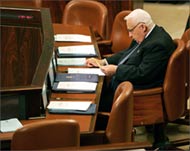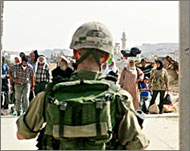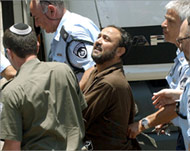Palestinian elections unsettle Israel
After the death last week of Palestine Liberation Organisation Chairman Yasir Arafat, Israel has indicated that it is yet to decide whether or not to allow Palestinians unfettered elections.

Palestinians argue that while the Israeli army occupies the West Bank and controls the bulk of the Gaza Strip it is impossible for them to hold free, fair and transparent elections.
The ubiquitous Israeli roadblocks impede campaigning, an essential process for any election, and many significant Palestinian leaders remain in Israeli prisons.
According to observers, Arafat’s death, long wished for by Israeli Prime Minister Ariel Sharon and his allies, especially the powerful military establishment, has created a dilemma for the Israeli government.
“Israel has been telling the world for years that Arafat is the main obstacle to peace,” says Samih Shabib, a Ram Allah-based columnist and political analyst.
 |
|
Prime Minister Ariel Sharon held |
“Now Arafat is dead, Israel should move forward toward the path of peace.
“But this is unlikely to happen. Sharon and his government will fetch another red herring. The real issue is not this or that leader, but Israel’s adamant refusal to come to terms with Palestinian rights.
“Israel prefers land over peace. This is what the world community ought to understand.”
Date set
The US and Europe, as well as the Palestinians, want democratic elections so Palestinians can choose a president and local and national representatives.
The speaker of the Palestinian legislative council, Rawhi Fattuh, who was sworn in as acting president last week, has announced that elections to choose a new Palestinian Authority (PA) president will take place on 9 January 2005.
President George Bush, during his joint news conference with visiting UK Prime Minister Tony Blair on Saturday, stressed democracy as essential, not only for a successful peace process, but for the realisation of Palestinian statehood.
For its part, Israel has been watching these developments with unease, realising that with the death of Arafat it has lost a useful propaganda tool.
International pressure
Sharon, casting off international demands that Israel should display goodwill towards the evolving Palestinian leadership, was quoted as saying that the “disappearance of a bad leadership does not mean that a good leadership has appeared”.
 |
|
Roadblocks will hinder candidates |
Sharon realises that the outcome of any free elections in the West Bank, Gaza Strip and East Jerusalem will not be good for Israel.
The people who will be elected are unlikely to budge on such issues as the status of Jerusalem, the Palestinian refugees’ right of return and the illegality of Israeli settlements.
Indeed, it is because of Arafat’s enduring refusal to give in on these issues that Israel and the US vilified him, and eventually declared him irrelevant and a non-partner.
Yet, the Israeli leadership realises that a rejectionist posture is likely to invite international pressure and condemnation.
“Israel and the US cannot eat the cake and have it at the same time,” said Ali Jarbawi, head of the Palestinian election committee and professor of political science at Bir Zeit University in the West Bank.
“Democracy is democracy and the Palestinian masses must be granted every right to choose their representatives regardless of the political views of these representatives.”
Political puppets
He accused President Bush of seeking to use elections as a means to “appoint certain people who would carry out the Israeli and American agenda”.
Jarbawi told Aljazeera.net he was concerned Israel would seek pretexts to maintain the status quo and prevent or dilute Palestinian elections.
“Sharon is already using the issue of terror in an effort to throw the ball into the Palestinian court. The man knows quite well that genuine peace demands a certain price which he and his government are not willing to pay. That is the crux of the matter.”
Some Israeli intellectuals do not hide their apprehension about the risk of allowing the Palestinians to hold free elections.
One such is Ira Sharkansky, professor of political science at the Hebrew University of Jerusalem.
He told Aljazeera.net that while he recognised the importance of holding elections, he was not sure they would produce the “right people” – whoever they might be. Any leadership was unlikely to meet with the Israeli definition of the “right people”.
Prisoners
None the less, Israel has a number of ways to manipulate Palestinian elections.
 |
|
Fatah member al-Barghuthi |
With the incarceration of between 7000 and 8000 Palestinian political and resistance figures, many of whom are popular political leaders both at the national level and in their immediate communities, Israel is able to restrict candidates.
One such leader is the secretary-general of Fatah, Marwan al-Barghuthi, who is reportedly interested in standing for election as PA president.
However, Israeli officials, including Foreign Minister Silvan Shalom, ruled out the possibility of releasing al-Barghuthi who is presently serving five life sentences.
“He is a terrorist and murderer and will remain in prison for the rest of his life,” said Shalom.
There are hundreds of other politicians in Israeli jails, many interned without charge or trial, whose participation in any elections is essential for their people’s success.
This is the view of Professor Abd al-Sattar Qasim, himself a presidential candidate.
“Israel cannot be trusted to allow free elections in Palestine.
“Israel is interested in one thing, the appearance of a quisling leadership that would cede Palestinian rights; that will never happen.”